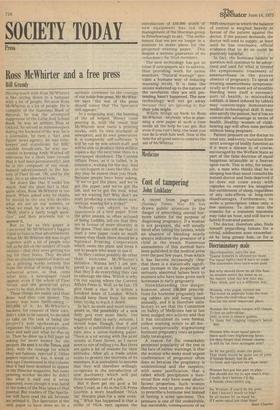Medicine
Cost of tampering
John Linklater
A recent front page article (Sunday Times, May 25) has drawn public attention to the danger of prescribing steroid hormone tablets for the purpose of diagnosing pregnancy. If a woman is not pregnant, she will usually bleed after taking the tablets, while an absence of bleeding nearly always indicates the presence of a child in the womb. Numerous assessments of this method have been published in the medical press over the past few years, from which it has become increasingly clear that there is a statistically significant increase in the proportion of seriously abnormal babies born to mothers who have been given such hormones in early pregnancy.
Notwithstanding this danger, however, about 100,000 prescriptions for hormone pregnancy testing tablets are still being issued annually, and it is therefore satisfactory to see that the Committee on Safety of Medicines has at last been nudged into activity and that it has circulated its own formal, yellow warning notice to all doctors, unequivocally stigmatising hormone pregnancy tests as potentially teratogenic.
A reason for the remarkably persistant popularity of the test in the face of earlier warnings, is that the woman who seeks most urgent confirmation of pregnancy often does so because the pregnancy is unintentional and she suspects, with some justification, that a tablet which precipitates a menstrual flow may have some abortifacient properties. Such women therefore tend to press the doctor to prescribe a hormone test instead of testing a urine specimen. This pressure is one of the undesirable, but inevitable, consequences of an NHS structure in which the balance of control is weighed heavily in favour of the patient against the doctor. If the patient demands, the doctor will tend to supply, at least until he has conclusive, official evidence that to do so could be positively harmful.
In fact, the hormone tablets in question will continue to be advertised and used for what is termed the symptomatic treatment of amenorrhoea in the proven absence of pregnancy. To speak of treating amenorrhoea symptomatically as if the mere act of monthly bleeding were itself a necessary part of health, is misleading rubbish. A bleed induced by tablets may convincingly demonstrate medical technological skill. It may also satisfy the patient, but it has no conceivable advantage in terms of health. Healthy women of childbearing age will often miss periods without being pregnant.
Patient pressure on the doctor to treat any, and every, variation from strict average of bodily function as if it were a disease is, of course, encouraged by the Welfare State as part of the false doctrine of equal happiness attainable in a heaven upon earth. This is why, for example, a man who thinks that he is sleeping less than usual consults his instant doctor and feels deprived if he does not come away with capsules to restore his imagined fair entitlement of sleep, regardless of any side-effects or long-term disadvantages. Furthermore, to write a prescription takes only a few minutes. To delve into the reasons for a transient insomnia may take an hour, and still leave a faintly frustrated patient.
The doctor, therefore also, finds himself prescribing lotions for a trivial, adolescent acne exacerbated by long greasy hair, or for a baby's dandruff which would be better cleared with olive oil and a fine comb. The list of pointless, undesirable and even dangerous treatments is endless.
The advent of the Welfare State seems to have coincided with a progressive loss of commonsense and robust independence, and of our ability to accept the natural minor ills of the flesh. The Health Education Council would do well to publish a pamphlet to be sold in surgeries, clinics and health centres to drive this point home, showing that man, in a healthy environment with adequate stimulus and exercise and food to which he is evolutionarily adapted, rarely needs medical intervention. When the doctor does have to intervene, there is often some price to bepaid in the form of an unforeseen sideeffect or unwelcome complication.



























 Previous page
Previous page